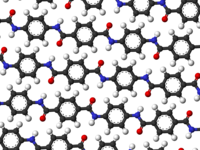
Photo from wikipedia
Abstract Molecular mobility of nanocomposites based on poly(phenylene oxide) (PPO) containing 1, 2, 4 and 8 wt% of C60 fullerenes was studied by dielectric spectroscopy. In all samples, two relaxation processes… Click to show full abstract
Abstract Molecular mobility of nanocomposites based on poly(phenylene oxide) (PPO) containing 1, 2, 4 and 8 wt% of C60 fullerenes was studied by dielectric spectroscopy. In all samples, two relaxation processes were present and caused by polarization of the single polar O group located between phenyl rings. This polarization includes two stages with the first stage (occurring in the glassy state) is caused by rotation of phenyl rings and the adjacent polar O groups by small angles that results in the local β process. The second stage (occurring at temperatures exceeding the glass transition temperature Tg) involves segmental mobility and leads to emergence of the α process. Molecular mobility in the region of the β process varies slightly with C60 concentration. In the case of the α process, molecular mobility changes non-monotonically with increasing fullerene concentration.
Journal Title: Journal of Non-crystalline Solids
Year Published: 2018
Link to full text (if available)
Share on Social Media: Sign Up to like & get
recommendations!